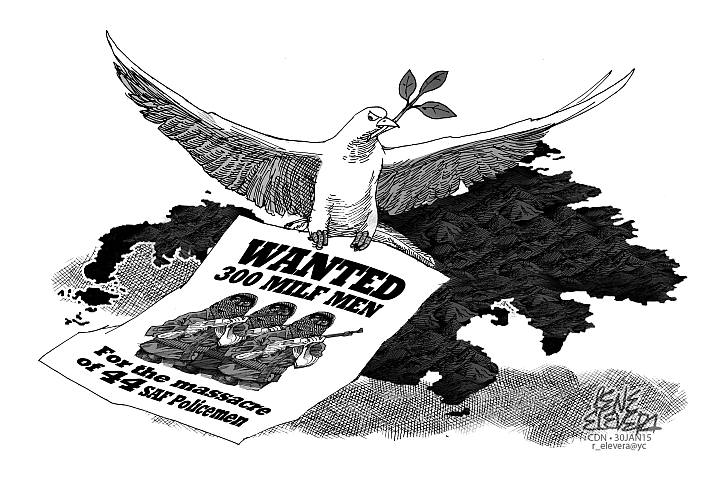The drums of war were beating loud after the slaughter of 44 elite police officers in Mamasapano town in Maguindanao province, Central Mindanao.
About 400 members of the Special Action Forces (SAF) of the Philippine National Police were sent to serve an arrest warrant and capture two terrorists with a $7-million bounty on their heads dangled by the US Federal Bureau of Investigation.
Malaysian Zulkifli Bin Hir, alias Marwan carried a $5-million reward for his neutralization, dead or alive. For Basit Usman, it was $2 million. Both were expert bomb makers and trainers linked to the South Asian terrorist group Jemaah Islamiyah. They were believed to be staying in the vicinity of encampments of the Moro Islamic Liberation Front (MILF) and Bangsamoro Islamic Freedom Fighters (BIFF).
Questions are being asked about why SAF forces did not follow the cease-fire rules agreed by the government and the MILF.
Was it naive of the government to send PNP agents who were unfamiliar with the terrain of this Mindanao war zone? To send them in without military support?
With emotions high over the casualty count, some politicians are beating on war drums by calling for the end of peace talks between the government and the MILF, a process in its final stages after decades of fighting and 17 years of negotiations.
Even as we demand accountability for the deaths in last Sunday’s gun battle, amid still unconfirmed reports of mutilation of the dead, it’s just as important for President Aquino to come clean on who was in charge, and who gave the green light. It is incomprehensible for an order for an operation of this scale and implications for ongoing peace talks not to have emanated from the commander in chief, and yet he was waffling in Wednesday’s address to the nation. Why so?
Imagine it the other way. If the mission had been successful, guess who would be claiming full credit?
The botched operation reinforces the image of a weak State. The Philippines is not a strong state, by reckoning of political experts abroad. By this we mean the country “lacks the essential capacity and/or will to fulfill four sets of critical government responsibilities.” These are: fostering an environment conducive to sustainable and equitable economic growth; establishing and maintaining legitimate, transparent, and accountable political institutions; securing their populations from violent conflict and controlling their territory; and meeting the basic human needs of their population.”
A 2008 study by the Washington-based Brookings Institution entitled “An Index of State Weakness in the Developing World,” ranked the Philippines 58th in a field of 141 countries. The weakest or failed states were ranked no. 1 in that study, a spot occupied by Somalia, followed by Afghanistan, Democratic Republic of Congo and Iraq.
The study described the Philippines as “on the cusp of designation as a weak state, performs above average on political and social welfare components of statehood but within the bottom quintile on security. It continues to confront an insurgency in Mindanao.”
By this yardstick, the Manila-centric government falls short in securing the population in Mindanao from violent conflict and controlling their territory; and meeting the basic human needs of their population.
For those who think that war is the answer, be careful of what you wish for. And pray that violence will not reach the doorsteps of those who call for more blood.
